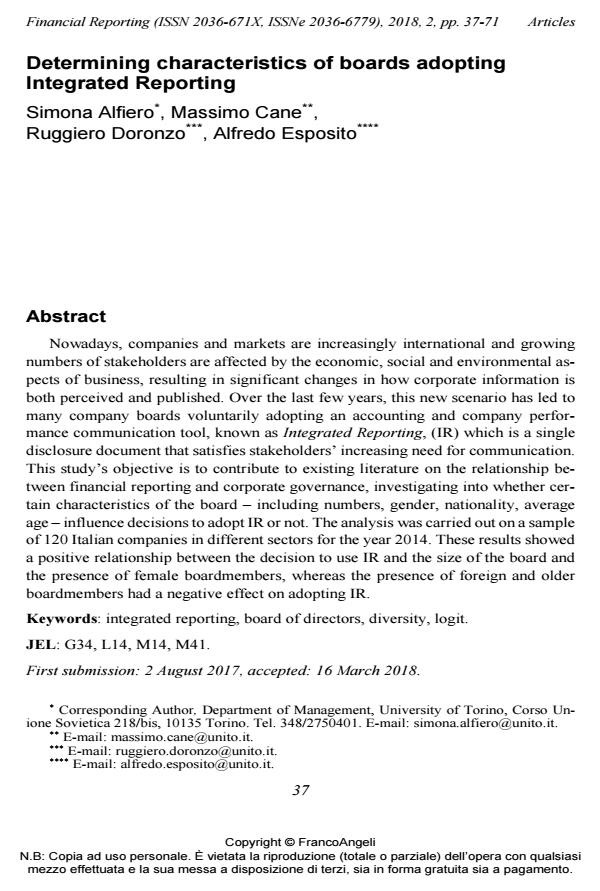Determining characteristics of boards adopting Integrated Reporting
Titolo Rivista FINANCIAL REPORTING
Autori/Curatori Simona Alfiero, Massimo Cane, Ruggiero Doronzo, Alfredo Esposito
Anno di pubblicazione 2018 Fascicolo 2018/2
Lingua Inglese Numero pagine 35 P. 37-71 Dimensione file 613 KB
DOI 10.3280/FR2018-002003
Il DOI è il codice a barre della proprietà intellettuale: per saperne di più
clicca qui
Qui sotto puoi vedere in anteprima la prima pagina di questo articolo.
Se questo articolo ti interessa, lo puoi acquistare (e scaricare in formato pdf) seguendo le facili indicazioni per acquistare il download credit. Acquista Download Credits per scaricare questo Articolo in formato PDF

FrancoAngeli è membro della Publishers International Linking Association, Inc (PILA)associazione indipendente e non profit per facilitare (attraverso i servizi tecnologici implementati da CrossRef.org) l’accesso degli studiosi ai contenuti digitali nelle pubblicazioni professionali e scientifiche
Nowadays, companies and markets are increasingly international and growing numbers of stakeholders are affected by the economic, social and environmental aspects of business, resulting in significant changes in how corporate information is both perceived and published. Over the last few years, this new scenario has led to many company boards voluntarily adopting an accounting and company performance communication tool, known as Integrated Reporting, (IR) which is a single disclosure document that satisfies stakeholders’ increasing need for communication. This study’s objective is to contribute to existing literature on the relationship between financial reporting and corporate governance, investigating into whether certain characteristics of the board - including numbers, gender, nationality, average age - influence decisions to adopt IR or not. The analysis was carried out on a sample of 120 Italian companies in different sectors for the year 2014. These results showed a positive relationship between the decision to use IR and the size of the board and the presence of female boardmembers, whereas the presence of foreign and older boardmembers had a negative effect on adopting IR.
Parole chiave:Integrated reporting, board of directors, diversity, logit.
Jel codes:G34, L14, M14, M41.
- La relazione tra l'esperienza degli amministratori e il business plan: un'indagine empirica sulle imprese quotate in Italia Emmadonata Carbone, Sara Saggese, Fabrizia Sarto, in MANAGEMENT CONTROL 1/2023 pp.69
DOI: 10.3280/MACO2023-001004 - The value relevance of integrated reporting in the United Kingdom Mbalenhle Khatlisi, Tafirei Mashamba, in Journal of Financial Reporting and Accounting /2025
DOI: 10.1108/JFRA-01-2025-0080 - Remote working and digital transformation during the COVID-19 pandemic: Economic–financial impacts and psychological drivers for employees Enrico Battisti, Simona Alfiero, Erasmia Leonidou, in Journal of Business Research /2022 pp.38
DOI: 10.1016/j.jbusres.2022.06.010 - Integrated reporting quality in Malaysia: Do chairman attributes matter? Sumaia Ayesh Qaderi, Sitraselvi Chandren, Zaimah Abdullah, in Cogent Business & Management 2186757/2023
DOI: 10.1080/23311975.2023.2186757 - Corporate Social Responsibility in Difficult Times Girish Napaul, Dineshwar Ramdhony, pp.171 (ISBN:978-981-99-2590-2)
- Integrated reporting quality and BoD characteristics: an empirical analysis Lucrezia Songini, Anna Pistoni, Patrizia Tettamanzi, Fabrizio Fratini, Valentina Minutiello, in Journal of Management and Governance /2022 pp.579
DOI: 10.1007/s10997-021-09568-8 - A study of mediating and moderating effects on the relationship between audit quality and integrated reporting quality among Jordanian firms Malik Abu Afifa, Isam Saleh, Rahaf Abu Al-Nadi, in Asian Review of Accounting /2025 pp.223
DOI: 10.1108/ARA-12-2023-0336 - Do audit committee attributes influence integrated reporting quality? An agency theory viewpoint Nicola Raimo, Filippo Vitolla, Arcangelo Marrone, Michele Rubino, in Business Strategy and the Environment /2021 pp.522
DOI: 10.1002/bse.2635 - Integrating SEM, Wald test and ANOM to disentangle the effect of TMT functional background on strategic plans Fabrizia Sarto, Sara Saggese, Emmadonata Carbone, Pasquale Sarnacchiaro, in Socio-Economic Planning Sciences 102083/2024 pp.102083
DOI: 10.1016/j.seps.2024.102083 - Beyond Financial Reporting. Integrated Reporting and its determinants: Evidence from the context of European state-owned enterprises Giuseppe Nicolò, Gianluca Zanellato, Francesca Manes-Rossi, Adriana Tiron-Tudor, in FINANCIAL REPORTING 2/2019 pp.43
DOI: 10.3280/FR2019-002003
Simona Alfiero, Massimo Cane, Ruggiero Doronzo, Alfredo Esposito, Determining characteristics of boards adopting Integrated Reporting in "FINANCIAL REPORTING" 2/2018, pp 37-71, DOI: 10.3280/FR2018-002003